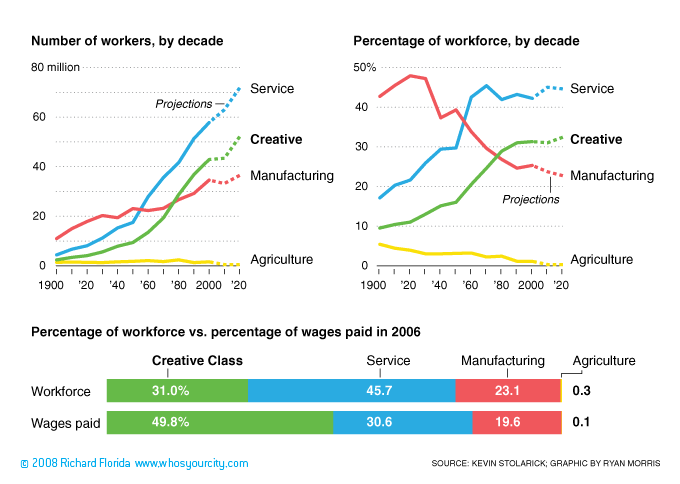A post-industrial economy refers to a period of growth within an industrialized economy that undergoes a transition from the production of goods to the provision of services. Knowledge becomes a valued form of capital, with an increase in the amount of information technology, often leading to an "information age". Information, knowledge, and creativity are the new raw materials of such an economy.
The industry aspect of a post-industrial economy is sent into less developed nations which manufacture what is needed at lower costs (see outsourcing). This occurrence is typical of nations that industrialized in the past such as the United States and most Western European countries. Through processes of globalization and automation, the value and importance to the economy of blue-collar, unionized work, including manual labor (e.g., assembly-line work) decline, and those of professional workers (e.g. scientists, creative-industry professionals, and IT professionals) grow in value and prevalence.
Many critics blame globalization for a decline of the middle class in industrialized countries, the middle class is growing rapidly in developing countries.
We have become a society in which an economic transition has occurred from a manufacturing based economy to a service based economy.
.

Comments (5)
f13soc1023001g3 said
at 10:17 am on Sep 17, 2013
A post-industrial economy refers to a period of growth within an industrialized economy or nation in which the relative importance of manufacturing lessens and that of services, information, and research grows. Such economies are often marked by:
A declining manufacturing sector, resulting in deindustrialization,
a large service sector, and
an increase in the amount of information technology, often leading to an "information age". Information, knowledge, and creativity are the new raw materials of such an economy.
The industry aspect of a post-industrial economy is sent into less developed nations which manufacture what is needed at lower costs (see outsourcing). This occurrence is typical of nations that industrialized in the past such as the United States and most Western European countries.
See also[edit source]
Dr. Pattie Thomas said
at 12:23 pm on Sep 17, 2013
Please move this content to separate pages to work on them. Each term should have it's own page. Also the pages should be in the Glossary folder. We do not have enough workspace for you to create a page like this and then move it.
Dr. Pattie Thomas said
at 11:36 am on Oct 3, 2013
This is too economics oriented. You need to bring this back to sociology, which is possible through several connecting terms:
Economy (Social Institution)
Globalizaton
Nationalization
Roles
Stratification
Technopoly
World Systems Theory
Connect this to one or more of the above terms, write about the connection and then write a sentence showing you understand the connection to finish the assignment.
Dr. Pattie Thomas said
at 11:37 am on Oct 3, 2013
I like the graphic, BTW, and I like Richard Florida's work.
f13soc1023001g3 said
at 2:37 pm on Oct 3, 2013
I have added some new definitions...still needs more work. elb
You don't have permission to comment on this page.